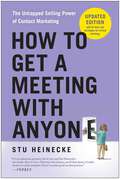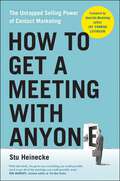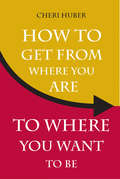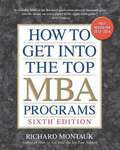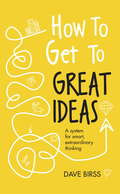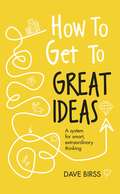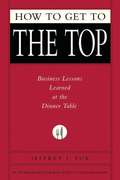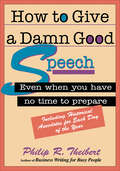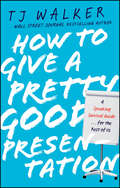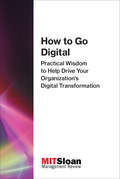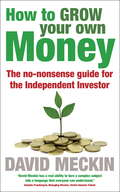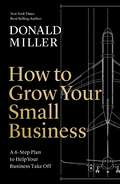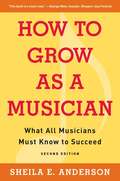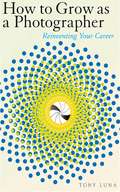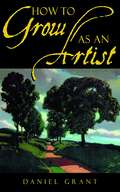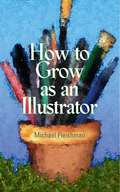- Table View
- List View
How to Get a Business Loan
by Joseph R. MancusoJoseph Mancuso means business. He takes you into your bank and into the offices of America's venture capitalists for an inside look at how they work and what they expect from prospective borrowers. He tells you exactly what actions to take every step of the way and how to distinguish yourself in the lender's eyes. How to Get a Business Loan will dramatically enhance your chances of putting together a deal you can live with and profit by.
How to Get a Great Job: A Library How-To Handbook (American Library Association Series)
by Editors of the American Library AssociationIn our difficult time, or at any time, knowing how to find a great job is a necessary skill. All the resources you need for a successful job search are at your fingertips--and completely free--at your public library. It can be a daunting task, so here is expert advice on how to conduct proper research, build networks of friends and colleagues, put together a great resume, research industries that are constantly changing, prepare for an interview, negotiate a contract or a salary, and more. This could be the turbo-boost your job search needs.
How to Get a Meeting with Anyone, Updated Edition: The Untapped Selling Power of Contact Marketing
by Stu HeineckeThe hard part just got easy. You know how to sell—that's your job, after all—but getting CEOs and VIPs to call you back is the tricky part. You're in luck: That impossible-to-reach person isn't so impossible to reach after all.Hall-of-Fame-nominated marketer and Wall Street Journal cartoonist Stu Heinecke discovered that he could get past traditional gatekeepers to reach those elusive executives by thinking outside the box and using personalized approaches he calls ""Contact Campaigns."" Including presidents, a prime minister, celebrities, countless CEOs, and even the Danish model who became his wife, Heinecke found that getting meetings with previously unreachable people was easier than ever. Now he shares his tactics and tips in this essential guide for anyone who needs to make contact. Featuring expanded content and brand new chapters, this updated edition of How to Get a Meeting with Anyone explains how you can use your own creative Contact Campaigns to get those critical conversations. He divulges methods he's developed after years of experience and from studying the secrets of others who've had similar breakthrough results—results that other marketers considered impossible, with response rates as high as 100 percent. Through real-life success stories, Heinecke lays out 20 categories of Contact Campaigns that anyone can research and execute. Tactics range from running a contact letter as a full-page ad in The Wall Street Journal to unorthodox uses of the phone, social media, email, and snail mail to using personalized cartoons to make connections. He also packs in plenty of tips on how to determine your targets, develop pitches, and gain allies in your contact's circle of influence. How to Get a Meeting with Anyone provides you with a new toolkit you can put to work right away so you can make the connections that are essential to your success."
How to Get a Meeting with Anyone: The Untapped Selling Power of Contact Marketing
by Stu HeineckeThe hard part just got easy. You know how to sell—that's your job, after all—but getting CEOs and VIPs to call you back is the tricky part. You're in luck: That impossible-to-reach person isn't so impossible to reach after all. Hall-of-Fame-nominated marketer and Wall Street Journal cartoonist Stu Heinecke discovered that he could get past traditional gatekeepers to reach those elusive executives by thinking outside the box and using personalized approaches he calls ""Contact Campaigns."" Including presidents, a prime minister, celebrities, countless CEOs, and even the Danish model who became his wife, Heinecke found that getting meetings with previously unreachable people was easier than ever. Now he shares his tactics and tips in this essential guide for anyone who needs to make contact. In How to Get a Meeting with Anyone, Heinecke explains how you can use your own creative Contact Campaigns to get those critical conversations. He divulges methods he's developed after years of experience and from studying the secrets of others who've had similar breakthrough results—results that other marketers considered impossible, with response rates as high as 100 percent. Through real-life success stories, Heinecke lays out 20 categories of Contact Campaigns that anyone can research and execute. Tactics range from running a contact letter as a full-page ad in The Wall Street Journal to unorthodox uses of the phone, social media, email, and snail mail to using personalized cartoons to make connections. He also packs in plenty of tips on how to determine your targets, develop pitches, and gain allies in your contact's circle of influence. How to Get a Meeting with Anyone provides you with a new toolkit you can put to work right away so you can make the connections that are essential to your success."
How to Get a Raise This Week: With or Without Your Boss's Permission
by Ryan ShafferHow to Get a Raise This Week: With or Without Your Boss’s Permission is written from an employer’s point of view for employees, pulling back the curtain between employer and employee. Written in simple language anyone can understand, it outlays principles that apply to virtually everyone and that anyone can adhere to. How to Get a Raise This Week: With or Without Your Boss’s Permission details not only what an employer looks for prior to giving out a pay raise but also what a person can do when NOT given one. It also shatters common misconceptions about the current economy, explains why simply working harder no longer gets people ahead, and unveils a blueprint anyone can follow to expand their personal wealth.
How to Get from Where You Are to Where You Want to Be
by Cheri HuberThis book tells you precisely how to examine an issue that is causing you difficulty, how to discover the source of the problem, and how to free yourself from the suffering that was created.
How to Get into the Top MBA Programs, 6th Editon
by Richard Montauk J.D.Sure-Fire Strategies for Getting into the Top MBA Programs Fully revised for 2013-2014 Now with new information on online MBA programs, comprehensive rankings of the leading schools, and new interviews with admissions officers, How to Get Into the Top MBA Programs provides a complete overview of what the top schools look for. This book features a step-by-step guide to the entire application process with in-depth advice from more than thirty admissions directors. It shows you how to: * Develop your optimal marketing strategy * Assess and upgrade your credentials * Choose the programs that are right for you * Write quality essays for maximum impact * Choose and manage your recommenders * Ace your interviews * Prepare for business school and get the most out of your program once you go This fully revised Sixth edition also offers expanded coverage of Asian programs, North American accelerated programs, and the latest insights on the new GMATs and GREs, making it the most comprehensive, trusted MBA guide on the market.
How to Get to Great Ideas: A system for smart, extraordinary thinking
by Dave BirssThe highly practical lessons in How to Get to Great Ideas are based on neuroscience, psychology and sociology. Written by former advertising creative director Dave Birss, this book offers a brilliant new system for conceiving original and valuable ideas. It looks at how to frame a problem, how to push your thinking, how to sell the idea, how to build support for it and how to inspire others to have great ideas. It proves that any organization - and any individual or department within an organization - can create a fertile environment for ideas. Combining a practical research-based system with fascinating insights and inspiring and humorous writing, the book also includes the problem-solving system RIGHT Thinking. This is a tool which enables a more effective way to generate more effective ideas, and is one that anyone can use to transform themselves or their business. Training on this system is also available in person from the author. And will be released soon as an online course.
How to Get to Great Ideas: A system for smart, extraordinary thinking
by Dave BirssThe highly practical lessons in HOW TO HAVE GOOD IDEAS are based on neuroscience,psychology, and behavioral economics. Written by the former Creative Director of OgilvyOne,Dave Birss,this book offers a brilliant new system for conceiving original and valuable ideas. It looks at how to frame the problem,how to push your thinking,how to sell the idea and build support for it and how to inspire others to have great ideas. It proves that any organization - and any department within an organization - can become a fertile environment for ideas.Combining a practical research-based system with fascinating insights and inspiring and humorous writing,the book is also accompanied by the problem solving system RIGHT THINKING. This is a tool which shows organizations a more effective way to generate more effective ideas and is based on the thinking in the book. This is available online and in person from the author.
How to Get to the Top: Business Lessons Learned at the Dinner Table
by Jeffrey J. FoxThe bestselling author of How to Become CEO returns with a pithy, smart, and useful collection of wisdom learned by business leaders at their own family dinners.Do you want to get to the top? Do you want to know how to rise above the crowd and become a leader in your field? Then this is the book for you. In How to Get to the Top, bestselling author Jeffrey J. Fox combines his own experience as an extremely successful entrepreneur with lessons learned at the family dinner table by business leaders such as Howard Schultz, CEO of Starbucks; Tom Chappell, founder of Tom's of Maine; Leslie Blodgett, CEO of Bare Escentuals; and George Steinbrenner, principal owner of the New York Yankees. The essential guide on how to get to the top--and stay there--this compelling book contains hard-hitting advice on independence and self-reliance, management dynamics, and problem solving, including: You can't unsour the milk. Speak sweetly: You may have to eat your words. Tip as if you were the tippee. Act like you own the place. You have to know the rules to break them. Never be late. Always compliment the chef . . . especially at home. Teach your girls to whistle. Spend the company's money as you would your own. Don't teach the quarterback to catch.
How to Give Your Kids $1 Million Each! (and It Won't Cost You a Cent)
by Ashley OrmondIT DOESN'T MATTER HOW MUCH YOU EARN OR HOW MUCH MONEY YOU HAVE--THERE IS A SIMPLE WAY FOR YOU TO GIVE YOUR KIDS $1 MILLION EACH--AND IT WON'T COST YOU A CENT!Based on the original bestseller and now fully updated, this simple plan is building wealth for thousands of families all over Australia. Follow this step-by-step guide to help you and your kids generate wealth and financial security. How to Give Your Kids $1 Million Each! Is a simple plan that just about anyone can follow. But you can give your children something even more valuable than $1 million--you can also provide them with the knowledge and skills to be able to manage their money and make it grow.Packed with useful tips, How to Give Your Kids $1 Million Each! doesn't involve any tricks, complex products, get-rich quick schemes or trading systems; just simple, actionable steps for you and your family. Using low-cost, tax-effective share and property investments--that you control--let compounding work its magic. And you only need to spend one hour per month on the plan.You can start the plan with as little as $1 per day and give your children a financial head start in life. So what are you waiting for--the earlier you start, the better!
How to Give a Damn Good Speech (30-Minute Solutions)
by Philip R. TheibertThe best advice, openings, stories, and facts for a standout speech—from a professional speechwriter for CEOs, political figures, and other top officials.Don’t let the mere thought of presenting a speech tie your stomach in knots and put you in state of sheer panic. Philip Theibert, author of Business Writing for Busy People, has written How to Give a Damn Good Speech to help you give any speech, sounding like a seasoned pro. He provides a blueprint for producing a professional, thought-provoking, friendly, and authoritative speech, even when you have very little time to prepare.How to Give a Damn Good Speech provides you with professional speech writers’ techniques to make each and every speech a powerful presentation. Theibert has done years of research and has read thousands of speeches in an effort to better illustrate his points and bring you the best examples possible. You can read the book in its entirety or, if you simply need a refresher, you can read the section that best suits your needs. This format allows you to focus on areas of your speech that most need help. Topics covered include:How to organize and write a speech100 important things you need to know about giving an effective speechInteresting and entertaining stories to use in any speechBest quotations ever heardHistorical anecdotes for each day of the yearHow to Give a Damn Good Speech, with its easy-to-read, accessible style, makes writing and giving speeches a breeze, and will prevent you from turning green the next time you’re asked to give a speech.
How to Give a Pretty Good Presentation
by T. J. WalkerReduce the time and stress associated with your presentationsBookshelves are crowded with books on how to be an exceptional presenter and promise to produce a brilliant, standing-ovation speaker. But what about a presentation resource for the rest of us? There are so many of us regular folk who who want to spend just a little time and effort to get over the big hurdle of giving a presentation, but don't know where to turn for advice.How to Give a Pretty Good Presentation is the easy answer to this common need. Straightforward, entertaining, and well-organized, this user-friendly resource will walk you step-by-step through the process from how to write, rehearse, and deliver a pretty good presentation that will make you appear confident, memorable, and competent. Although it does not promise the moon (or a standing ovation), this public speaking survival guide will help you:Appear confident (even while still feeling nervous!)Take the spotlight off of you and put it on your contentSave timeNot put people to sleep with your PowerPoint PresentationProduce better resultsMake better impressionsReduce the feelings of dread, sleeplessness, and procrastination associated with your presentationsPrepare even if you've waited until the day before or an hour before your presentation is to be givenWhatever your job, if you need to give a presentation and are feeling overwhelmed by it, How to Give a Pretty Good Presentation is there for you. If you want to reduce the time and stress associated with your presentations now and pass all future presentation opportunities with flying colors, then pick up this fun and accessible guide; you'll no doubt like the resulting improvement in both your personal and professional bottom line.
How to Go Digital: Practical Wisdom to Help Drive Your Organization's Digital Transformation (The Digital Future of Management)
by MIT Sloan Management ReviewAdvice on how companies can succeed in the new digital business environment.The most important skills a leader needs to succeed in a digital environment are not technical in nature but managerial—strategic vision, forward-looking perspective, change-oriented mindset. A company's digital transformation does not involve abandoning widget-making for app developing or pursuing “disruption” at the cost of stability. Rather, it is about adopting business processes and practices that position organizations to compete effectively in the digital environment. More important than technology implementation are strategy, talent management, organizational structure, and leadership aligned for the digital world. How to Go Digital offers advice from management experts on how to steer your company into the digital future.The book will put you on the right strategic path, with articles from MIT Sloan Management Review on developing a digital strategy, reframing growth for a digital world, monetizing data, and generating sustainable value from social media. Talent acquisition and retention are addressed, with articles on HR analytics, data translators, and enabling employees to become brand ambassadors outside of the office. Operational makeovers are discussed in terms of sales, services, new technologies, and innovation.ContributorsAllan Alter, Stephen J. Andriole, Bart Baesens, Gloria Barczak, Cynthia M. Beath, Alpheus Bingham, Didier Bonnet, Chris Brady, Joseph Byrum, Marina Candi, Manuel Cebrian, Marie-Cécile Cervellon, Simon Chadwick, Sophie De Winne, Mike Forde, Gerald C. Kane, Rahul Kapoor, David Kiron, Thomas Klueter, Mary C. Lacity, Rikard Lindgren, Pamela Lirio, Tucker J. Marion, Lars Mathiassen, Pete Maulik, Paul Michelman, Narendra Mulani, Pierre Nanterme, Doug Palmer, Alex “Sandy” Pentland, Anh Nguyen Phillips, Frank T. Piller, Iyad Rahwan, Deborah L. Roberts, Jeanne W. Ross, Ina M. Sebastian, Luc Sels, James E. Short, Fredrik Svahn, Steve Todd, Leslie P. Willcocks, H. James Wilson, Barbara H. Wixom
How to Go to Work: The Honest Advice No One Ever Tells You at the Start of Your Career
by Steven Haines Lucy ClaytonThe definitive careers guide for starting out in today's working worldIt's tougher than ever to get the fundamental skills you need to get started and thrive in your career.Whether you are on your first Saturday shift, about to start an apprenticeship or climbing the leadership ladder, this is your indispensable guide to surviving and thriving at work.Find out what really matters in getting hired for your first job and how to make the best start in your new role. Drawing on the collective wisdom of CEOs, creatives, scientists, activists and professionals in every industry, this is all you need to know about how to go to work.From dealing with your mistakes to celebrating your successes, from making an impression on day one to building your resilience and protecting your values, How to Go to Work is packed full of all the vital advice you need to jump-start your fledgling career. This vital practical guide will show you how to:- Find the right work experience and internships to get you through the door- Present your best self online and in person- Gain confidence, authority and resilience and thrive in your role- Navigate the ups and downs of starting your first or second job and help you make progress in your careerFrom office etiquette and how to make the most of any placement, to employment rights, how to deal with toxic workplaces, pensions and negotiating pay rises, How To Go To Work is the essential guide for anyone embarking upon or consolidating their career.
How to Graduate Debt Free: The Best Strategies to Pay for College #notgoingbroke
by Kristina EllisNearly 70% of students graduate with close to $30,000 in debt. But you don't have to be one of them! In these pages, acclaimed author Kristina Ellis walks you through the wide world of college-finance options, presenting tips, secrets, and strategies so you can develop a personalized plan. A plan to overcome obstacles and get your degree debt-free. With Kristina as your mentor, you'll discover how to: -Establish a winning money mindset -Save up and cut costs before you get to campus -Figure out the dollars and sense of financial aid -Secure your share of free cash for college -Earn money to pay as you go -Choose a school and a major that's worth it -Stretch your funds when every penny counts With determination, the right information, and a well-planned strategy, you can earn that career-advancing degree and graduate from college debt-free. #NotGoingBroke
How to Grow Your Own Money: The no-nonsense guide for the Independent Investor
by David MeckinCut out the middleman and take control of your personal finance.In the wake of banking crises and financial scandals there is now a common mistrust of financial advisers - the 'experts'. People believe that that financial institutions are more interested in making money out of you through management fees than making money for you.But now you too can manage your money and gain the confidence to make your investments work without relying on anyone else. After all, the whole point of investing is getting your money to work for you (not the other way round)! How to GROW Your Own Money gives practical guidance from a highly successful, fellow independent money investor using trusted techniques that show how you can do it too. It puts you in control of your finances and could save you a fortune in management fees.
How to Grow Your Own Money: The no-nonsense guide for the Independent Investor
by David MeckinIn the wake of banking crises and financial scandals there is now a common mistrust of financial advisers - the 'experts'. People believe that financial institutions are more interested in making money out of you through management fees than in making money for you. But now you too can manage your money and gain the confidence to make your investments work without relying on anyone else. After all, the whole point of investing is getting your money to work for you (not the other way round)! How to Grow Your Own Money gives practical guidance from a highly successful, fellow independent investor using trusted techniques that show how you can do it too. It puts you in control of your finances and could save you a fortune in management fees. It's not as difficult or time-consuming as you think. David Meckin keeps things simple, showing you how to save money by cutting out the middleman, how to save time without cutting corners and how to maximize your returns by applying his tried and tested 6R approach: Recognize, Reward, Risk, Research, Review and Revisit to four main areas: shares, savings accounts, property and bonds.
How to Grow Your Own Money: The no-nonsense guide for the Independent Investor
by David MeckinIn the wake of banking crises and financial scandals there is now a common mistrust of financial advisers - the 'experts'. People believe that financial institutions are more interested in making money out of you through management fees than in making money for you. But now you too can manage your money and gain the confidence to make your investments work without relying on anyone else. After all, the whole point of investing is getting your money to work for you (not the other way round)! How to Grow Your Owen Money gives practical guidance from a highly successful, fellow independent investor using trusted techniques that show how you can do it too. It puts you in control of your finances and could save you a fortune in management fees. It's not as difficult or time-consuming as you think. David Meckin keeps things simple, showing you how to save money by cutting out the middleman, how to save time without cutting corners and how to maximize your returns by applying his tried and tested 6R approach: Recognize, Reward, Risk, Research, Review and Revisit to four main areas: shares, savings accounts, property and bonds.
How to Grow Your Small Business \ Cómo hacer crecer tu negocio (Sp. ed.): Un plan de 6 pasos para que tu pequeña empresa tome vuelo
by Donald Miller«Si buscabas un plan sencillo y probado para hacer crecer tu negocio, ahora lo tienes en tus manos». —LEWIS HOWES, autor de La escuela de la grandezaBestseller del Wall Street Journal.Dirigir un negocio suele alejarse mucho de lo que nos imaginamos al emprender. Creemos que lo más difícil es dar el primer paso y empezar a vender, pero nadie nos advierte que la mayoría de las pequeñas empresas quiebra por no saber gestionar ese crecimiento. Si tu negocio te pide a gritos un plan para crecer de manera segura y confiable, pero no sabes por dónde comenzar, llegaste al lugar indicado.Cómo hacer crecer tu negocio es un sencillo manual de 6 pasos que te ayudará a profesionalizar tu operación y aumentar tus ganancias e ingresos, sin importar el tipo o el tamaño de tu compañía. Diseñado y probado por el exitoso empresario y autor bestseller Donald Miller, este novedoso sistema hará que tu empresa tome vuelo, y que tú ganes dinero, tranquilidad y tiempo para dedicarte a lo que realmente te gusta.Aquí aprenderás sobre:Liderazgo: cómo crear y ejecutar un plan de crecimiento fácil y confiable.Marketing: cómo atraer, expandir y mantener tu base creciente de clientes ideales.Ventas: cómo dejar de vender e invitar a los clientes a formar parte de una historia.Optimización del producto: tácticas para identificar áreas en las que puedes aumentar la capacidad para servir mejor a tu mercado.Operaciones: la mejor manera de estructurar tu negocio es maximizar tus habilidades y delegar las áreas que deben ser manejadas por otra persona.Flujo de caja: cómo gestionar el dinero que ingresa para que este crezca en lugar de desaparecer misteriosamente.Entonces, ¿estás listo para despegar?———“If you're looking for an easier, proven plan to grow your business, you've found it." —Lewis Howes, author of the New York Times bestseller, The School of GreatnessA Wall Street Journal Bestseller.Running a business often turns out to be very different from what we imagine when we first start out. We think the hardest part is taking that first step and igniting sales. However, everybody forgets to mention that most small businesses fail because they don’t know how to manage growth. If your small business pleads for a plan to grow safely and reliably, but you don’t know where to start, you’ve come to the right place.How to Grow Your Business is a simple 6-step guide that will help you professionalize your operations and increase your profits and revenue, no matter the type or size of your company. Designed and tested by successful entrepreneur and bestselling author Donald Miller, this innovative system will help your business take off, while you gain money, peace of mind, and time to focus on what you truly love. So, are you ready to take off?
How to Grow Your Small Business: A 6-Step Plan to Help Your Business Take Off
by Donald MillerThe Wall Street Journal BestsellerFor so many entrepreneurs, running a small business ended up looking different than they imagined. They&’re stressed, discouraged, and not confident in their plan for growth. In How to Grow Your Small Business, Donald Miller gives entrepreneurs a 6-step plan to grow their businesses so they produce dependable, predictable results.Using the exact steps you&’ll learn in this book, Donald Miller grew his small business from four employees working out of a basement to a 15 million dollar operation, increasing revenue sixfold in just six years. As Miller grew his own business from the ground up, he realized nobody had put together a simple, step-by-step playbook for growing a business. That book didn&’t exist. Until now.In this book, you&’ll learn the 6 steps to grow a successful small business and create a playbook to implement them- your Flight Plan. When you have a completed Flight Plan in hand, you can stop drowning in the details and spend more time doing the things you truly love- in your business and your life.In How to Grow Your Small Business, you&’ll learn how to:Cast a vision for your company that includes three economic prioritiesClarify your marketing messageInstall a sales framework that makes your customers the heroOptimize your product offeringRun a management and productivity playbook that aligns your entire team.Use 5 checking accounts to manage your cash flowIf you&’re ready to experience freedom, flexibility, and growth for your business, How to Grow Your Small Business is the book you&’ve been waiting for.
How to Grow as a Musician: What All Musicians Must Know to Succeed
by Sheila E. AndersonA Friendly Guide to Launching and Maintaining Your Musical Career It&’s tough to make a living from one&’s love of music, but Sheila E. Anderson shows readers how to do just that in How to Grow as a Musician. This encouraging yet realistic guide covers everything from developing and learning one&’s craft to managing the business aspects of a musical career. This second edition expands on performance tips, self-promotion tactics, and steps to improve one&’s networking skills to make fruitful connections. Anderson shares her insights as well as practical advice from successful musicians and other industry professionals on topics such as:Composing and recordingUnderstanding and negotiating contractsPutting on a performanceGetting and keeping gigsUtilizing social mediaAnd moreHow to Grow as a Musician is packed with candid views on everything from overcoming failure to the art of writing a song to doing that all-important ego check. Whether they&’re just getting started or have been in the business for years, all musicians will reap the rewards of this thoughtful career guide.
How to Grow as a Photographer: Reinventing Your Career
by Tony LunaAre you bored producing the same old work, but do it because it's safe? Are corporate politics, outsourcing, or the digital revolution too much for you to handle? Has a personal tragedy caused you to reevaluate your career path? If you answered yes to any of these questions, look no further than this inspirational guide. Topics include: --Recognize when something is wrong --Use work-history and personal timelines to meld your passions with your career choices --Reeducate yourself when faced with creative challenges --Embrace risk and evaluate your assets to make your next move --Sell your unique vision through a "Passion First" marketing approach --Manage your time and your business effectively --Use time-management techniques to stay focused and increase your creative output. You will also be inspired by the stories of other creative entrepreneurs who have made their own successful transitions. Whether you are a mid-career professional or just starting out, this book will set you on the path to creative and professional growth.
How to Grow as an Artist
by Daniel GrantIn this definitive guide to resources, aspiring artists and serious amateurs devoted to their art will find scores of time-tested strategies to help them set up and work safely from a home studio; learn where and how to acquire appropriate art materials; develop their abilities with others as well as create art alone; explore opportunities for education in a wide variety of forms; overcome mental blocks; mat, frame, pack, and ship works of art; and much more. Artists looking to show and sell their work will find no-fail ideas for marketing, exhibiting, and entering the world of galleries. Filled with entertaining success stories, this is one volume for the bookshelf of every artist hoping to attain satisfaction and pleasure though his or her art. Plus, dozens of well-known artists-as well as those successful on their own terms-share their own success stories and sources for artistic inspiration.
How to Grow as an Illustrator
by Michael FleishmanFleishman offers guidance for illustrators on how to grow professionally. He covers inspiration, education and starting out, professional development and transitions, career maintenance, teaching, and different markets, as well as mechanical and conceptual skills and how they impact design, process, and product. The business of illustration is addressed, as are marketing and promotion, dealing with failure, and the professional community, and incorporated throughout the book are interviews with active illustrators. There is no bibliography. Fleishman is a freelance illustrator, graphic artist, and teacher of commercial arts. Annotation ©2008 Book News, Inc. , Portland, OR (booknews. com)


